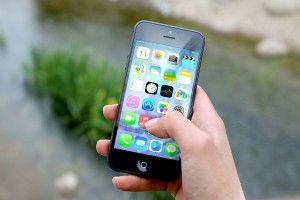Advances in mobile technology allow for sophisticated mobile health.
With 9 in 10 Americans owning some kind of cell phone, 2016 is looking to be an exciting year for mobile health – that is, health care or health information delivered through mobile devices like cell phones, tablets, and smartphones [1-3]! Mobile health is definitely a game-changer: It has the potential to keep costs low and increase access to health information and medical attention – especially for those who may not have easy access to care (for instance, because they live in rural areas) [1].
Smartphones Getting Smarter
All of this said, we might want to wait to pop the champagne or cancel our next in-person doctor appointment. As many of us know, Internet access can be unreliable if there is a problem with the smartphone – and this can be especially frustrating if it’s your only way to get online [4]. Many people who rely on smartphones as their only Internet access also report that they’ve had to pause their cell phone service for a period of time for financial reasons [4]. Additionally, 1 in 3 people who rely strictly on smartphones for Internet access report that they “frequently” hit the maximum amount of data allowed in their cell service plan [4]. Thus, the use of health apps and things like video-chatting with doctors, while potentially transformative, may only be available to a lucky few until the rest of us – and our technology – can catch up [1].
What about Phones That Can’t Download Fancy Apps, Etc.?
Programs that use basic cell phone features to deliver health information have the potential to improve a lot of health behaviors [6]. Specifically, text messages don’t require Internet access – the user doesn’t need to log in to use it or even own a smartphone. Plus, they don’t use any data.
Text messaging-based programs have also been shown to improve health outcomes [6]. For instance, patients are a lot more likely to remember their doctor’s appointment with automated text message reminders. Text message reminders can also help parents remember to get their kids the flu shot. Many text messaging-based programs can also send their users regularly scheduled reminders to take their medications (e.g., for asthma, HIV). These are just a handful of examples of the way a simple technology harnesses the popularity of cell phones and improves health for many.
To read more on mobile health, check out our blog post: With mHealth, Mobile Technology Improves Our Health.
Learn more about our research at Center for Innovative Public Health Research.
Find us on Google+, Twitter, and Facebook.
Thanks to Emilie Chen for her contributions to this blog.
References:
[1] Brohan M. Mobile will be a top health industry trend in 2016. MobileStrategies360. 2015; https://www.mobilestrategies360.com/2015/12/11/mobile-will-be-top-health…
[2] Elias J. In 2016, Users Will Trust Health Apps More Than Their Doctors. Forbes. 2015; http://www.forbes.com/sites/jenniferelias/2015/12/31/in-2016-users-will-…
[3] Mobile health technology hub. AthenaHealth. http://www.athenahealth.com/knowledge-hub/mobile-health-technology/what-…
[4] Smith A. U.S. Smartphone Use in 2015. PewResearchCenter. 2015; http://www.pewinternet.org/2015/04/01/us-smartphone-use-in-2015/
[5] Topol EJ. The Future of Medicine Is in Your Smartphone. The Wall Street Journal. 2015; http://www.wsj.com/articles/the-future-of-medicine-is-in-your-smartphone…
[6] U.S. Department of Health and Human Services. Using Health Text Messages to Improve Consumer Health Knowledge, Behaviors, and Outcomes. 2014; http://www.hrsa.gov/healthit/txt4tots/environmentalscan.pdf

